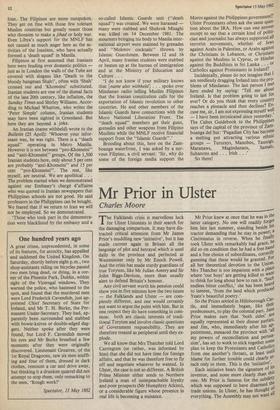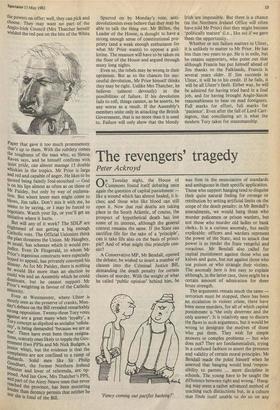Mr Prior in Ulster
Charles Moore
The Falklands crisis is marvellous luck for Ulster Unionists in their search for the damaging comparison. It may have dis- tracted critical attention from Mr James Prior's muddling new 'initiative', but it has made current again in Britain all the language of plot and betrayal which is used daily in the province and perfected at Westminster only by Mr Enoch Powell. And the crisis has made sturdy guardians of true Toryism, like Mr Julian Amery and Sir John Biggs-Davison, more than usually alert to defend Britain's honour.
Any civil servant worth his pension could show you in five minutes how the two issues — the Falklands and Ulster — are com- pletely different, and one would certainly not want to argue the point with him. But in one respect they do have something in com- mon: both are classic interests of tradi- tional Toryism and involve classic questions of Government responsibility. They are therefore treated as peripheral until they ex- plode.
We all know that Mrs Thatcher told Lord Carrington (or rather, was informed by him) that she did not have time for foreign affairs, and that he was therefore free to fly off and negotiate whatever he wanted. In Ulster, the case is not so different. A British Prime Minister either sends to Northern Ireland a man of unimpeachable loyalty and poor prospects (Mr Humphrey Atkins), or a considerable figure whose presence in real life is becoming a nuisance.
Mr Prior knew at once that he was in the latter category. No one will readily forget him late last summer, standing beside his tractor demanding that he stay in power; a Cincinnatus in reverse. When he finally took Ulster with remarkably bad grace, he did so on condition that he had a free band and a free choice of subordinates, correctly guessing that these would be granted. For all her theoretical devotion to the Union, Mrs Thatcher is too impatient with a place where 'our boys' are getting killed to want to think for long about how to run it. 'Such endless bitter conflict,' she has been heard to lament, 'from the land which produced Yeats's beautiful poetry.' So the Priors settled in Hillsborough Cas- tle, and immediately began, like their predecessors, to play the colonial part. Jane Prior makes sure that 'both sides' arc equally represented at their dinner parties, and Jim, who, immediately after his ap- pointment, menaced the province with 'all my powers of reconciliation and persua- sion', has set to work to stick together some plan to keep the Protestants and Catholics from one another's throats, at least until blame for further trouble could clearly at- tach only to them. This is the 'initiative':
Each initiative bears the signature of its inventor, and none more clearly than this one. Mr Prior is famous for the subtlety which was supposed to have disarmed the trade unions. In Ulster, he has thought everything. The Assembly may not want all the powers on offer: well, they can pick and choose. They may want no part of the Anglo-Irish Council (Mrs Thatcher herself wielded the red pen on the bits of the White Paper that gave it too much prominence): that's up to them. With the subtlety comes the toughness of the man who, so Simon Raven says, and he himself confirms with quiet pride, can almost manage 13 double Whiskies in the tropics. Mr Prior is large and red and capable of anger. He likes to be quoted being faintly foul-mouthed — God is on his lips almost as often as on those of Mr Paisley, but only by way of exclama- tion. But where lesser men might come to blows, Jim talks. Don't mix it with me, he seems to be saying, or I may be forced to negotiate. Watch your lip, or you'll get an initiative where it hurts. ,Blit will any of it work? The SDLP are 'ligtened of not getting a big enough Catholic vote. The Official Unionists think the plan threatens the Union. Mr Haughey, as usual, has schemes which it would pre- Rid. ice. Even Dr Fitzgerald, to whom Mr Prior's ingenious constructs were especially no, ped to appeal, has privately conveyed his dismay. May. As for Mr Paisley, there is nothing he would like more than an election he could win and an Assembly which he could Prior's nominate, but he cannot support Mr weighting in favour of the Catholic minority. Even at Westminster, where Ulster is ,ninstly seen as the preserve of cranks, Mon- day's debate on the Bill revealed remarkably strong opposition. Twenty-three Tory votes against are a great many when 'loyalty', a Tory concept as slipshod as socialist 'solida- rity', is being demanded 'because we are at W.ar'. There have even been three resigna- tions , scarcely ones likely to topple the Gov- ernment (two PPSs and Mr Nick Budgen, a JUm0t whip), but the evidence is that the complaints are not confined to a rump of ebards. Solid men like Sir Philip Go odhart, the former Northern Ireland Minister and lover of referenda, are op- Posed. And Ian Gow, Mrs Thatcher's PPS, and Part of the Airey Neave team that never reached the province, has been muttering louder than decency permits that neither he nor she is fond of the Bill. Spurred on by Monday's vote, anti- devolutionists even believe that they may be able to talk the thing out. Mr Biffen, the Leader of the House, is thought to have a strong enough sense of constitutional pro- priety (and a weak enough enthusiasm for what Mr Prior wants) to oppose a guil- lotine. The measure will have to be taken on the floor of the House and argued through many long nights.
Even so, the rebels may be wrong in their optimism. But as to the chances for suc- cessful devolution, Mr Prior himself thinks they may be right. Unlike Mrs Thatcher, he believes (almost devoutly) in the possibilities of failure. If his devolution fails to roll, things cannot, as he asserts, be any worse as a result. If the Assembly's members unite only in attacking the British Government, that is no more than it is used to. Failure will only show that the bloody Irish are impossible. But there is a chance (as the Northern Ireland Office will often have told Mr Prior) that they might become `politically mature' (i.e., like us) if we gave them the opportunity.
Whether or not failure matters to Ulster, it is unlikely to matter to Mr Prior. He has less than two years to go. He is in exile, but he retains supporters, who point out that although Francis has put himself ahead of Jim thanks to the Falklands, Francis is several years older. If Jim succeeds in Ulster, it will be to his credit. If he fails, it will be all Ulster's fault. Either way, he will be admired for having tried hard in a foul job, and for having brought Anglo-Saxon reasonableness to bear on mad foreigners. Full marks for effort, full marks for `patience'. Even after the fall of Lord Carr- ington, that conciliating art is what the modern Tory takes for statesmanship.







































 Previous page
Previous page